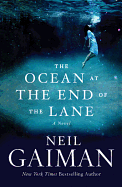
When a man returns to the Sussex country town where he grew up, he is inexplicably drawn toward the house at the end of the lane where he met Lettie Hempstead, her mother and her grandmother. When he was seven, a lodger at his parents' house stole the family car, drove it to the nearby beach and committed suicide in it. That act released a terrible, ancient power, putting the young boy and his family in danger. Meeting Lettie and her wise and loving family is the only hope he has left to keep himself from utter and terrifying destruction.
The Ocean at the End of the Lane, Neil Gaiman's first novel for adults since Anansi Boys (2005), shows his continuing power as a storyteller for any age. The subtle and elegiac tale manages to maintain its mystery while remaining grounded in reality. This is fiction as truth, in the way that all of Gaiman's best work exists in reality even while exploring the fantastic or otherworldly.
What matters in the end, really, is the journey that the narrator experiences. This man's time with the Hempsteads has affected him profoundly, disconnecting him from the ordinary and mundane. The events of the past are both real and unreal at the same time, a metaphor for the transition from child to adult, naiveté to wisdom and fantasy to reality. --Rob LeFebvre, freelance writer and editor

